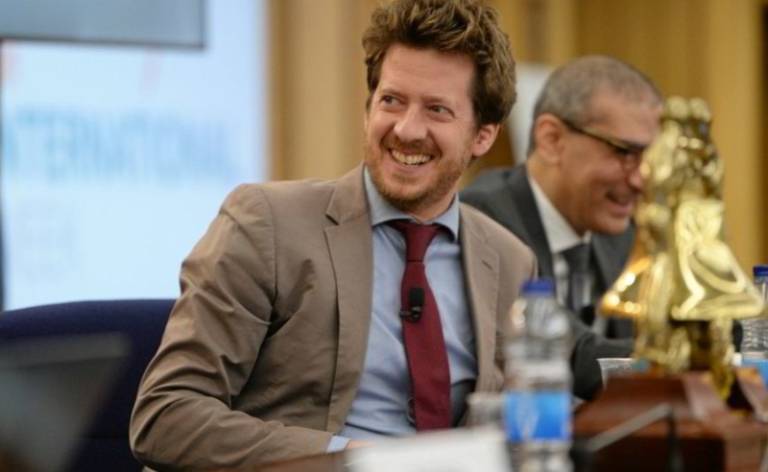Spotlight on...Tristan Smith
16 August 2023
This week we meet Tristan Smith, Associate Professor in Energy and Transport at the Bartlett School of Environment, Energy & Resources. Tristan talks to us about his long association with UCL, and his work making the global shipping industry more environmentally friendly.

What is your role and what does it involve?
I’m an Associate Professor in Energy and Transport, leading a research group focused on shipping. I do teaching, research, enterprise and engagement activities that revolve around the decarbonisation of this watery transport mode – which means figuring out the way demand, efficiency and energy transition (from oil to batteries, wind and hydrogen-derived fuels) might reach zero greenhouse gas (GHG) emissions within the next 20 years, through a combination of industry and policy actions.
How long have you been at UCL and what was your previous role?
A long time – I did an MSc, PhD and RA position in UCL mechanical engineering and then an RA, lectureship and now associate professorship in the Bartlett. Two decades this September in total. Towards the end of my PhD, working under a very empowering professor (aka one very happy to delegate…), I had the opportunity to be involved in a large and ambitious EPSRC funding bid, I had always been keen to lead my own research and when the bid was successful, I gained the confidence I could be good at it too. I was very lucky to come across Mark Barrett, Tadj Oreszczyn and Bob Lowe whilst doing that, who were just setting up the Bartlett’s Energy Institute, and it was obvious this would be an exciting place to spend a few years – I’m still there 13 years later.
What working achievement or initiative are you most proud of?
In July this year, the UN agency that regulates international shipping upped its targets for GHG reductions, requiring the average ship to create ~90% less GHG emissions by 2040. Our research and actions as a research group were central to the political and technical debates and to the strength of an outcome that now has an excellent chance of unleashing trillions of USD of renewable energy investment and enabling shipping to become one of the sectors most closely aligned to a 1.5 transition pathway – when a few years ago it was dismissed by many as ‘hard to abate’.
Tell us about a project you are working on now which is top of your to-do list
The key to the next phase of shipping’s energy transition is structuring the way capital is allocated to prioritise the needs of lower-income countries and to find synergies between shipping and their wider mitigation and adaptation challenges. We are working to provide key research and build networks between lower-income countries in Africa, the Pacific, Asia and the Caribbean that can further identify, support and co-create research that aligns with their policy objectives, and capacity development.
What is your favourite album, film and novel?
- Album – Seasick Steve, I Started Out With Nothin and I Still Got Most of it Left
- Film – Monty Python and The Holy Grail
- Novel – The Unbearable Lightness of Being, Milan Kundera
What is your favourite joke (pre-watershed)?
What do you call an Italian man with a rubber toe? Robberto…
Who would be your dream dinner guests?
Bridget Christie, Stewart Lee, Kier and Victoria Starmer. Comedians can concisely cut to the core of some of the absurdities of modern society, which would be fun to put up against those with some similar ideologies but faced with more practical challenges.
What advice would you give your younger self?
Keep thinking ahead and then think ahead more, don’t forget to also think about things other than work.
What would it surprise people to know about you?
Very very little, I fail every time I try to stray outside of my stereotype!
What is your favourite place?
An anchorage on the Greek island of Meganisi.
 Close
Close

